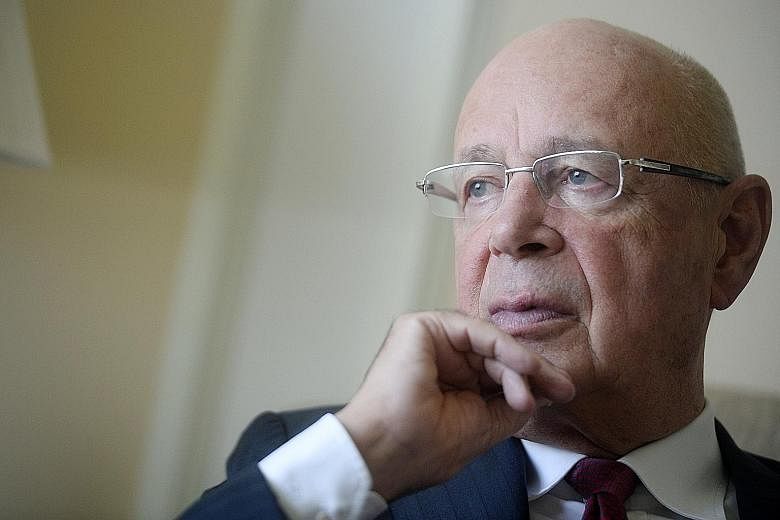The World Economic Forum (WEF) wants to break the silos in which global organisations work.
The forum, best known for hosting the premier Davos meeting of political, business and social leaders, wants these international entities to work together for global benefit.
This will be the next chapter in the 45-year-old organisation's work, Professor Klaus Schwab, its founder and executive chairman, told The Sunday Times while on a visit to Singapore last week. Besides sharing his vision for the forum, Prof Schwab also took up a range of issues in the interview.
These include the rise of robots and leaps in artificial intelligence as part of what he calls the Fourth Industrial Revolution, as well as the future of jobs and global challenges - such as deforestation.
"When you look at global cooperation, it's still traditional - I would say antiquated, analogue mode. You have a conference, you create a commission, you have reports. We feel that if you want to make progress with global cooperation, we also need dimension," he said.
One way of doing this would be to bring organisations such as the World Bank, the Organisation for Economic Cooperation and Development, and the World Health Organisation to work with the WEF and other stakeholders. Another way would be to create digital platforms to bring them together.
Prof Schwab conceived the idea of the WEF in 1971. Then a professor of business policy at the University of Geneva, he brought together European business leaders for a discussion on global management practices in the Swiss Alpine resort of Davos. Encouraged by its success, he launched the European Management Forum a year later and in 1974, invited political leaders to join. In 1987, he changed the name to World Economic Forum and today, it is the go-to conference for top leaders.
The WEF, meanwhile, has branched into holding conferences in other parts of the world. The organisation has also progressed to building communities such as Young Global Leaders and providing strategic insight with over a hundred reports, among them the World Competitiveness Report.
Its most recent effort has been to launch initiatives to "create an impact". More than 50 are under way, in areas ranging from agriculture and deforestation to economic and social inclusion and building gender parity.
One which launched recently in Singapore is Grow Asia, which seeks to replicate the success of a similar initiative in Africa. Grow Africa, which aspires to mobilise investments for sustainable growth, saw more than US$10 billion (S$13.5 billion) being raised for its efforts. Through its Singapore initiative, the WEF is hoping to do the same for the Asean region.
Another initiative is an effort to preserve tropical forests. The WEF has been able to form an alliance of governments like Indonesia and companies such as Unilever to work together to protect forests and fight climate change.
"It's very difficult to make progress through the traditional pattern of international negotiations, government to government, because governments would feel they have to sacrifice national interest for global common interest. If you bring business, civil society and governments together, you have a different form of dialogue," he said, adding that it would give longer-term solutions.

